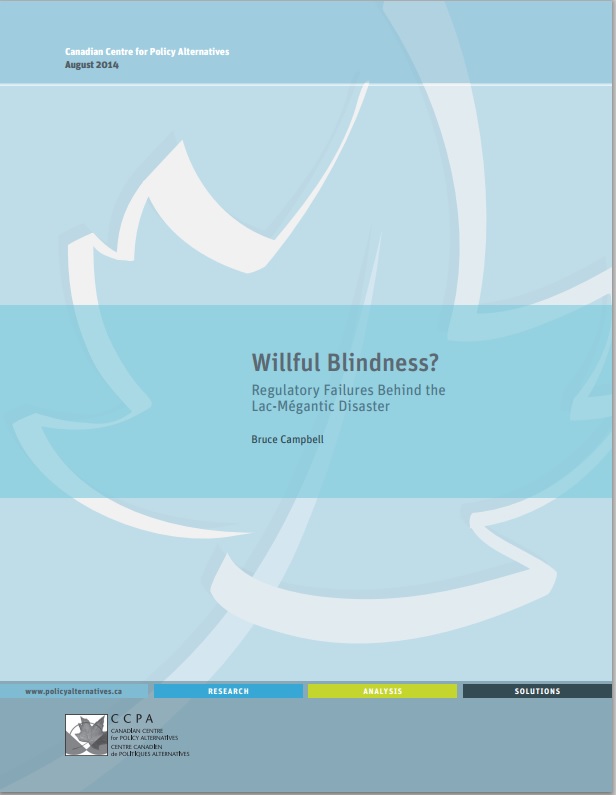This is an archive of news stories and research from the National Union of Public and General Employees. Please see our new site - https://nupge.ca - for the most current information.
While the federal government has so far not acknowledged any culpability or responsibility for the accident in Lac-Mégantic, the reality is that there were multiple regulatory failures. The Canadian Centre for Policy Alternatives (CCPA) asks, "Was this a case of willful blindness?"
 Ottawa (19 Aug. 2014)—In advance of a Transportation Safety Board (TSB) final report on why a train loaded with crude oil crashed and killed 47 people in Lac-Mégantic, Québec, just over a year ago, the Canadian Centre for Policy Alternatives (CCPA) has released a report detailing eight key ways in which regulatory failure contributed to the disaster.
Ottawa (19 Aug. 2014)—In advance of a Transportation Safety Board (TSB) final report on why a train loaded with crude oil crashed and killed 47 people in Lac-Mégantic, Québec, just over a year ago, the Canadian Centre for Policy Alternatives (CCPA) has released a report detailing eight key ways in which regulatory failure contributed to the disaster.
Willful Blindness?, a report by CCPA Executive Director Bruce Campbell, chronicles how Canada's federal regulatory regime failed—directly and indirectly—to prevent corporate negligence, for which the citizens of Lac-Mégantic paid a terrible price.
"Experts and government officials warned that the railway cars carrying crude oil were unsafe and that they shouldn't be operated by one person only—but they were ignored," says Campbell. "
Federal system failed the people of Lac-Mégantic
Among the ways that Canada's federal regulatory system failed Lac-Mégantic are:
- Transport Canada's railway operating rules are at times vague and inadequately enforced, giving companies too much latitude and granting too many exemptions.
- Senior Transport Canada officials, over objections from their Montreal office and the union, granted permission to Montreal, Maine & Atlantic railway to operate trains carrying massive amounts of crude oil, a dangerous good, each with a one-person crew.
- Transport Canada, despite multiple warnings, allowed crude oil to be transported in unsafe tank cars.
- Transport Canada disregarded concerns about the explosiveness of Bakken crude, had lax testing requirements, and collected insufficient data about the transportation of dangerous goods.
- Transport Canada's Safety Management Systems were defective—lacking sufficient oversight and enforcement.
- Transport Canada's risk assessment processes and protocols were flawed.
- Transport Canada was complacent in light of the oil-by-rail boom, allocating insufficient regulatory resources to cope with the massive surge.
- Transport Canada has allowed the industry lobby to become too powerful, compromising public safety.
There needs to be an independent inquiry
How far will the TSB report go in highlighting negligence within the industry and failure within government? How far up the pyramid of responsibility will it probe?
The CCPA report calls for an independent inquiry. "Lac-Mégantic is the most devastating Canadian rail disaster in a century. How is it possible that it does not warrant an external, fully independent inquiry? This is a necessary prerequisite to truly understanding what happened and prevent future disasters," Campbell said.
More information:
Willful Blindness (pdf)
NUPGE
The National Union of Public and General Employees (NUPGE) is one of Canada's largest labour organizations with over 340,000 members. Our mission is to improve the lives of working families and to build a stronger Canada by ensuring our common wealth is used for the common good. NUPGE
